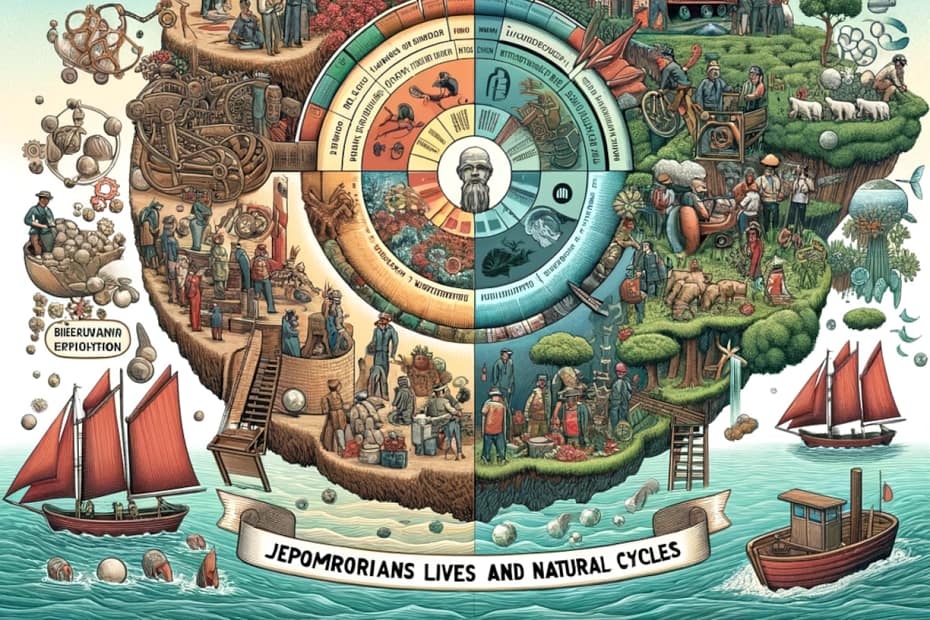Amid the myriad forms of life that inhabit our planet, humans stand out for a disturbing peculiarity: the transformation of the natural environment into a complex economic system. This transformation is fueled by human labor, a force that extends beyond mere survival and reproduction. This phenomenon, which we call “Work,” represents an anomaly in the context of life on Earth.
Origin of the Anomaly
The root of this anomaly can be traced back to the early stages of humanity, specifically to the advent of agriculture and the subsequent development of sedentary societies, around 10,000 years ago. This period, known as the Neolithic Revolution, marked a fundamental shift in the way humans interacted with their environment.
Before this era, humans, like other species, were integrated into their ecosystems in a more direct and immediate way, living as hunter-gatherers. They used kinetic potential energy in ways that were in harmony with natural cycles and ecological systems.
However, with the onset of agriculture, humans began to modify the environment and ecosystems in unprecedented ways to grow food and raise animals. This was the first step towards a labor-based economy that transcends mere subsistence, leading to the accumulation of surplus and the formation of complex social and economic structures.
Expansion of the Anomaly
Over the centuries, the anomaly expanded through industrialization, which began in the 18th century. The industrial revolution intensified the transformation of the natural environment and the exploitation of resources in a way that had never been seen before. The introduction of fossil-fuel-powered machines, mass production, and accelerated urban growth exacerbated the imbalance between human activities and natural cycles.
This phase of the anomaly saw human kinetic potential energy being used not only to drastically alter the environment but also to create an interconnected global economy, characterized by an unceasing quest for growth and profit, often at the expense of natural systems and social equity.
Consequences and Reflections
Today, we face the consequences of this anomaly: climate change, biodiversity loss, large-scale pollution, and deep inequalities. The economy, a human creation, has become an autonomous entity that seems to operate independently of ecological limits, threatening the very existence of life on Earth.
The anomaly of human labor, therefore, is not just a distinctive feature of our species; it has become an existential threat. We are now at a critical point where reflection and action are imperative. We must question and reassess our understanding and practice of “work” in a broader context of sustainability and justice.
This site, “Work is the Anomaly of Human Life on Earth,” is a platform dedicated to exploring these issues, challenging conventional notions of economy, work, and progress, and seeking pathways to a more harmonious coexistence between humans and the Earth we share.
Portuguese version
Trabalho é a Anomalia da Vida Humana na Terra
Em meio às miríades de formas de vida que habitam nosso planeta, os seres humanos se destacam por uma particularidade inquietante: a transformação do ambiente natural em um complexo sistema econômico. Esta transformação é alimentada pelo trabalho humano, uma força que vai além da simples sobrevivência e reprodução. Este fenômeno, que denominamos “Trabalho”, representa uma anomalia no contexto da vida na Terra.
Origem da Anomalia
A raiz desta anomalia pode ser traçada de volta aos primeiros estágios da humanidade, especificamente ao advento da agricultura e ao subsequente desenvolvimento de sociedades sedentárias, aproximadamente 10.000 anos atrás. Este período, conhecido como a Revolução Neolítica, marcou uma mudança fundamental na maneira como os humanos interagiam com seu ambiente.
Antes dessa era, os humanos, assim como outras espécies, estavam integrados em seus ecossistemas de maneira mais direta e imediata, vivendo como caçadores-coletores. Eles utilizavam a energia potencial cinética de maneiras que estavam em harmonia com os ciclos naturais e os sistemas ecológicos.
No entanto, com o início da agricultura, os humanos começaram a modificar o ambiente e os ecossistemas de forma sem precedentes para cultivar alimentos e criar animais. Esta foi a primeira etapa em direção a uma economia baseada no trabalho que transcende a mera subsistência, levando à acumulação de excedentes e à formação de estruturas sociais e econômicas complexas.
A Expansão da Anomalia
Com o passar dos séculos, a anomalia se expandiu através da industrialização, iniciada no século XVIII. A revolução industrial intensificou a transformação do ambiente natural e a exploração dos recursos de uma maneira que nunca havia sido vista antes. A introdução de máquinas movidas a combustíveis fósseis, a produção em massa e o crescimento urbano acelerado exacerbaram o desequilíbrio entre as atividades humanas e os ciclos naturais.
Esta fase da anomalia viu a energia potencial cinética humana ser utilizada não apenas para alterar drasticamente o ambiente, mas também para criar uma economia global interconectada, caracterizada por uma busca incessante por crescimento e lucro, muitas vezes à custa dos sistemas naturais e da equidade social.
Consequências e Reflexões
Hoje, enfrentamos as consequências desta anomalia: mudanças climáticas, perda de biodiversidade, poluição em larga escala e desigualdades profundas. A economia, uma criação humana, tornou-se uma entidade autônoma que parece operar independentemente dos limites ecológicos, ameaçando a própria existência da vida na Terra.
A anomalia do trabalho humano, portanto, não é apenas uma característica distintiva da nossa espécie; tornou-se uma ameaça existencial. Estamos agora em um ponto crítico, onde a reflexão e a ação são imperativas. Devemos questionar e reavaliar nosso entendimento e prática do “trabalho” em um contexto mais amplo de sustentabilidade e justiça.
Este site, “Trabalho é a Anomalia da Vida Humana na Terra”, é uma plataforma dedicada a explorar estas questões, desafiando as noções convencionais de economia, trabalho e progresso, e buscando caminhos para uma coexistência mais harmoniosa entre os humanos e a Terra que compartilhamos.
